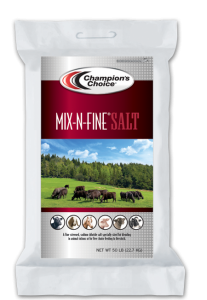- Rough coats
- Decreased performance
- Unusual eating habits like consuming dirt or chewing on tool handles, trees, board fences or another animal’s mane or tail.
- In poultry, an increase in pecking behavior, feather eating, general flock nervousness, and/or reduced egg production.
What happens if my chickens overconsume salt?
Chickens consuming too much salt may reduce their feed intake or could develop kidney disease, resulting in increased mortality rates. Excess salt intake may also result in sticky manure, causing dirty eggs.
How much salt should my chickens consume?
It is imperative that salt be part of a chicken’s diet. Salt should be present in chicken feeds at an approximate rate of 0.15%. If salt is restricted in early weeks, the health of the birds may not completely recover.
How much reduction in egg production will I see in a hen with a low sodium diet?
Even a slight reduction in the amount of sodium can result in a 20-60% reduction in egg production over the span of 15 days. For example, if 10 hens normally lay one egg per day, normal production would be 150 eggs over 15 days; with a reduced sodium diet, production could decrease to 90 eggs.
What are the symptoms of salt deprivation for chickens?
Chickens that have low salt rations may lose weight. In addition, there may be an increase in pecking behavior, feather eating and general flock nervousness. They may also show signs of reduction of egg production and egg size.
Is water softener salt harmful to animals?
Water softening salts are not intended for human or animal feeding. For some animals, particles may be too large and cause choking issues. In addition, some water softening salts may have additives that are inappropriate for animal feeds.
How does sodium deprivation occur in animals?
Sodium deprivation can be precipitated by dietary, climatic and disease factors and occurs under the following conditions:
- Rapidly growing animals given cereal-based diets that are inherently low in sodium
- Animals grazing pastures on soils naturally low in sodium
- Animals grazing pastures heavily fertilized with potassium
- Lactating animals, particularly cows, secreting large amounts of sodium in mild climates
- Tropical or hot, semi-arid climates, causing large losses of water and sodium in sweat
- Heavy or intense physical work that causes profuse sweating
- Animals with gut infections that cause diarrhea
When one or more of these conditions exist continuously for long periods and extra salt is not provided, sodium deprivation is inevitable.
Mix-n-Fine® Salt
A fine-screened sodium chloride salt specially sized for blending in animal rations (feed mixing) or for free-choice feeding of salt to livestock. This salt product is intended for beef cattle, dairy cows, horses, goats, pigs, poultry and sheep. This salt is suitable for all animal diets, but should not be used for direct human-food applications.
Available Form:
50 lb bag (22.7 kg bag)

